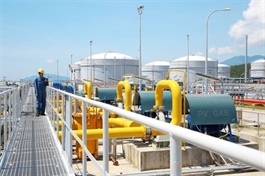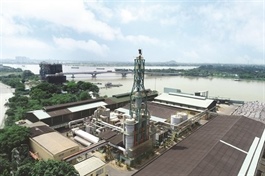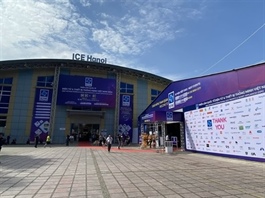Việt Nam poised to become the third-largest data centre market in ASEAN
Việt Nam poised to become the third-largest data centre market in ASEAN
Việt Nam's data centre industry is set for significant expansion, driven by recent investment reforms and a commitment to enhancing digital infrastructure.
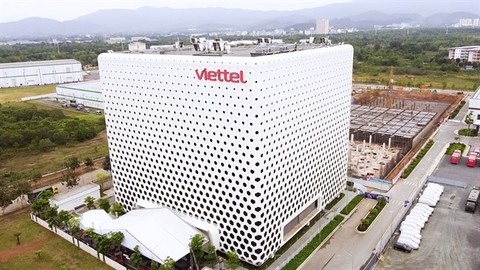
Viettel's data centre in Hòa Lạc High-tech Park in Hà Nội. — Photo courtesy of Viettel |
With a more open investment environment and a shift in regional focus from markets like Indonesia and Malaysia, Việt Nam is poised to become a key player in Southeast Asia’s data centre landscape.
During a mid-October meeting with Vietnamese Prime Minister Phạm Minh Chính, the chairman of Hyosung announced the Korean group's intention to invest an additional US$4 billion in Việt Nam, targeting the expansion of industrial data centres and high-tech materials production. This investment is expected to create around 10,000 jobs and boost the country's economic growth.
Before Hyosung's announcement, foreign investors, including Alibaba, Google and an unnamed investor from Singapore, were also eyeing substantial investments in Việt Nam's data centre market.
Data centres are crucial facilities that store and manage servers and data, supporting cloud computing, website hosting and IT operations. Ireland-based company Research and Markets predicts that Việt Nam’s data centre market will exceed US$1.26 billion by 2030, with a compound annual growth rate of 10.8 per cent. The market's growth potential is substantial, especially as the country promotes a digital economy and attracts investment in semiconductor technology and artificial intelligence (AI).
Currently, Việt Nam operates approximately 148 megawatts (MW) of data centre capacity, primarily in Hà Nội and HCM City, with an additional 80MW under construction, including STT's notable 60MW facility in HCM City. Viettel is set to further expand this capacity with a planned 560MW increase by 2030.
Việt Nam has opened its cloud computing and data centre market to foreign companies with the updated Telecommunications Law 2023, which took effect on July 1, allowing foreign investors to fully own domestic data centres.
According to BMI Country Risk & Industry Research, the removal of the 49 per cent foreign ownership cap has sparked investor interest and facilitated full foreign investment in the sector. This liberalisation, along with ambitious digital infrastructure reforms – encompassing 5G, fibre optics and subsea connections – has created a fertile environment for data centre and cloud investors.
“If investment patterns persist, Việt Nam may be on track to receive nearly 1GW of data centre capacity from local and foreign platforms, potentially making it the third-largest data centre market in emerging Southeast Asia,” the research notes.
Challenges
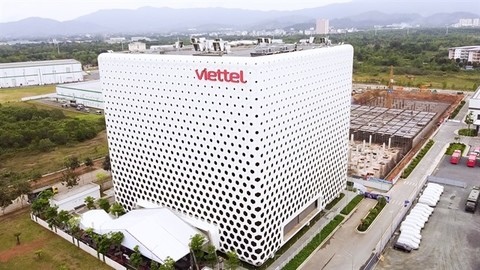
A data centre invested by VNPT in Hòa Lạc High-tech Park in Hà Nội. — Photo hanoimoi.vn |
Despite a positive outlook, challenges persist in obtaining US-made Graphics Processing Units (GPUs) for graphics and data processing and Tensor Processing Units (TPUs) for machine learning. However, alternatives like Huawei’s Ascend chips provide viable solutions for enhancing local data centre performance.
In addition, at the 2024 Investor Conference organised by VinaCapital early this month, CEO Don Lam disclosed a Singaporean investor's interest in investing over $1 billion in a Vietnamese data centre, provided that clean energy sources are used to distinguish it from competitors.
Currently, the Vietnamese data centre market is dominated by domestic telecommunications companies like VNPT, Viettel IDC, FPT Telecom and CMC Telecom, which hold 97 per cent of the market share. However, international interest in this sector is on the rise.
Vũ Hoàng Liên, chairman of the Vietnam Internet Association, attributes the growth of data centres to digitalisation, cloud computing, high data usage, 5G development and regulations on local data storage.
"The Government is accelerating its digital transformation, aiming to convert 50 per cent of businesses to digital platforms by 2025. Việt Nam's 5G connectivity supports low-latency edge data centres," he said.
"Việt Nam is a priority for investors and operators considering market entry. Its strategic location, dynamic policies, tech-savvy youth and increasing data demand make the Vietnamese data centre market highly promising in Asia."
However, the influx of new data centres may challenge electricity usage.
"Sectors like chip manufacturing and AI, which consume considerable power, will strain the existing grid. Therefore, upgrading the power grid is essential," said Trang Bùi, CEO of Cushman & Wakefield Việt Nam.
Experts caution that foreign investors remain hesitant due to electricity shortages, unattractive investment incentives, and inadequate internet infrastructure reliant on outdated submarine cables.
However, as investors look to diversify in Southeast Asia, Việt Nam could capitalise on the cooling investment in Malaysia – recent regulatory changes there aimed at sustainable development may deter further investments, encouraging investors to consider less saturated markets like Việt Nam and Thailand.











